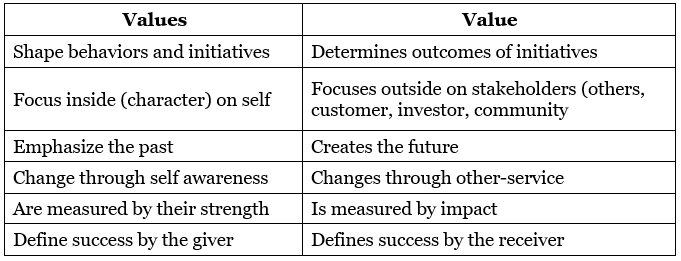Dave Ulrich: The value of values – defeating disconnection through human capability
- 3 Min Read
In today’s evolving world of work, HR thought leader Dave Ulrich defines why the value of values matters for human capability (talent, leadership, organization, HR).
- Author: Dave Ulrich
- Date published: Aug 16, 2022
- Categories

Value and values are not the same, and when combined, they complement each other (see figure 1). When we understand the value of values, we focus our values on the value they create for others. While values matter because they shape beliefs, beliefs embody attitudes, and attitudes determine behaviors, defining the value of values matters more for all four domains of human capability (talent, leadership, organization, HR) in today’s evolving world of work.
Figure 1: Values and Value

As the world evolves to new realities with ongoing viruses, technology/digital innovations, social justice movements, and political upheavals, traditional values-based questions about the four domains of human capability can be better answered by considering the value of values.
- Individual: How do I realize personal meaning from my work?
- Leadership: How do I (or we) lead, or prepare others for leadership, in the new world of work?
- Organization: How can my organization create the right culture to shape how work is done?
- Human Resources (HR): What can HR (department and people) do to influence the future of work?
Value of values for individuals
At a personal level, values clarification is an initial step for personal progress. In coaching, my first question is often “What do you want?” If those I coach do not know what they want, based on their values, someone else will likely define their wants, often not always in their best interest.
The second coaching question I ask magnifies the first and represents the value of personal values: “Whom do you serve?” Without serving others, personal wants (based on values) are acted on more often in isolation and distanced from others. This can cause loneliness, one of the fastest growing psychological threats, which increases as people socially isolate from each other.
When individuals define their values (based on heritage, predispositions, and experiences), they determine and build on their strengths. Then to pivot from loneliness to connection, one’s values can help others discover their value when individuals build on their strengths to strengthen others.
Value of values for leaders and leadership
Perhaps the simplest and most intuitive test of an effective leader is how often one leaves an interaction with the leader feeling better about oneself.
While individual leaders are wisely encouraged to demonstrate character by living their values (called authenticity, emotional intelligence, credibility trust), if their values do not create value for others, they fail to use their power to empower others. Leaders are ultimately known by the impact they have on others when they help others recognize and live their values.
In addition to helping individuals as leaders, most companies build leadership competency models based on successful leaders’ attitude, knowledge, and behavior. While important, too often these competency models are inside-out, determined by looking back to identify competences of leaders based on past actions inside the company.
The value of values examines leadership outside-in by starting with the brand promises made to customers looking forward. When leadership actions reflect customer promises, leadership values create value for others through what we have called a leadership brand.









